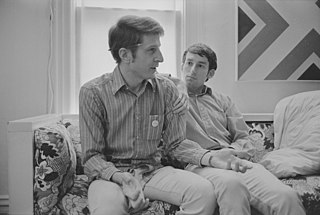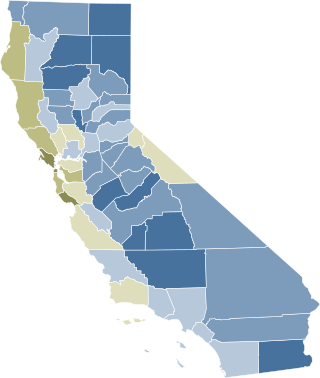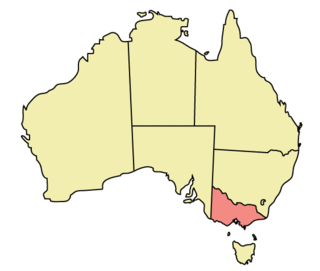Related Research Articles

The Equal Rights Amendment (ERA) is a proposed amendment to the U.S. Constitution that would, if added, explicitly prohibit sex discrimination. It was written by Alice Paul and Crystal Eastman and introduced in Congress in December 1923 as a proposed amendment to the United States Constitution. The purpose of the ERA is to guarantee equal legal rights for all American citizens regardless of sex. Proponents assert it would end legal distinctions between men and women in matters of divorce, property, employment, and other matters. Opponents originally argued it would remove protections that women needed. In the 21st century, opponents argue it is no longer needed and some disapprove of its potential effects on abortion and transgender rights.

The availability of legally recognized same-sex marriage in the United States expanded from one state (Massachusetts) in 2004 to all fifty states in 2015 through various court rulings, state legislation, and direct popular votes. States each have separate marriage laws, which must adhere to rulings by the Supreme Court of the United States that recognize marriage as a fundamental right guaranteed by both the Due Process Clause and the Equal Protection Clause of the Fourteenth Amendment to the United States Constitution, as first established in the 1967 landmark civil rights case of Loving v. Virginia.

Phyllis Stewart Schlafly was an American attorney, conservative activist, and anti-feminist who was nationally prominent in conservatism. She held paleoconservative social and political views, opposed feminism, gay rights, and abortion, and successfully campaigned against ratification of the Equal Rights Amendment to the U.S. Constitution.
Loving v. Virginia, 388 U.S. 1 (1967), was a landmark civil rights decision of the U.S. Supreme Court which ruled that laws banning interracial marriage violate the Equal Protection and Due Process Clauses of the Fourteenth Amendment to the U.S. Constitution. Beginning in 2013, the decision was cited as precedent in U.S. federal court decisions ruling that restrictions on same-sex marriage in the United States were unconstitutional, including in the Supreme Court decision Obergefell v. Hodges (2015).

Lesbian, gay, bisexual, and transgender (LGBT) rights in the United States are among the most advanced in the world, with public opinion and jurisprudence changing significantly since the late 1980s.

A Family Policy Council (FPC) is one of several US state-level organizations affiliated with Focus on the Family (FotF), a nationwide conservative Christian organization. Family Policy Councils work for policies that FotF describes as "pro-family". These include opposition to same-sex marriage, LGBT adoption, and LGBT workplace protections, and support for abstinence-only sex education, increased legal restrictions on abortion and traditional Christian gender roles. FPCs also work to shape public opinion, organize political demonstrations, and cultivate future politicians.

Nebraska Initiative 416 was a 2000 ballot initiative that amended the Nebraska Constitution to make it unconstitutional for the state to recognize or perform same-sex marriage, same-sex civil unions or domestic partnerships. The referendum was approved on November 7, 2000, by 70% of the voters. The initiative has since been struck down in federal court and same-sex marriage is now legally recognized in the state of Nebraska.

The Amendment 774 of 2006, also known as Alabama Sanctity of Marriage Amendment, is an amendment to the Alabama Constitution that makes it unconstitutional for the state to recognize or perform same-sex marriages or civil unions. The legislature passed Alabama Act 2005-35, which placed this amendment on the election ballot. The referendum was approved by 81% of the voters.

2006 Virginia Question 1, the Marshall-Newman Amendment is an amendment to the Constitution of Virginia that defines marriage as solely between one man and one woman and bans recognition of any legal status "approximat[ing] the design, qualities, significance, or effects of marriage". The amendment was ratified by 57% of the voters on November 7, 2006. It became part of the state Constitution as Section 15-A of Article 1. In 2014, the amendment was ruled unconstitutional in Bostic v. Schaefer.

The Woodhull Freedom Foundation, also known as Woodhull Sexual Freedom Alliance, is an American non-profit organization founded in 2003 that advocates for sexual freedom as a fundamental human right. The organization is based in Washington, D.C., United States. Named after an influential member of the American woman's suffrage movement, Victoria Woodhull, its focus includes analyzing groups and individuals that seek to perpetuate a culture of sexual repression.

Lesbian, gay, bisexual, and transgender (LGBT) rights in Kosovo have improved in recent years, most notably with the adoption of the new Constitution, banning discrimination based on sexual orientation. Kosovo remains one of the few Muslim-majority countries that hold regular pride parades.

Proposition 8, known informally as Prop 8, was a California ballot proposition and a state constitutional amendment intended to ban same-sex marriage; it passed in the November 2008 California state elections and was later overturned in court. The proposition was created by opponents of same-sex marriage in advance of the California Supreme Court's May 2008 appeal ruling, In re Marriage Cases, which followed the short-lived 2004 same-sex weddings controversy and found the previous ban on same-sex marriage unconstitutional. Proposition 8 was ultimately ruled unconstitutional by a federal court in 2010, although the court decision did not go into effect until June 26, 2013, following the conclusion of proponents' appeals.

The Australian state of Victoria is regarded as one of the country's most progressive jurisdictions with respect to the rights of lesbian, gay, bisexual, and transgender (LGBTQ) people. Victoria is the only state in Australia, that has implemented a LGBTIQA+ Commissioner.

Equal Love is an Australian-wide campaign initiated by the Victorian Gay and Lesbian Rights Lobby in an attempt to win gay and lesbian couples marriage rights in the country. The campaign involves a range of community, union, student and activist organisations whose aim is to influence public and government attitudes towards LGBTQ couples through education and direct action.

North Carolina Amendment 1 is a partially overturned legislatively referred constitutional amendment in North Carolina that amended the Constitution of North Carolina to add ARTICLE XIV, Section 6, which prohibit the state from recognizing or performing same-sex marriages, civil unions or civil union equivalents by defining male–female marriage as "the only domestic legal union" considered valid or recognized in the state. It did not prohibit domestic partnerships in the state and also constitutionally protected same-sex and opposite-sex prenuptial agreements, which is the only part that is still in effect today. On May 8, 2012, North Carolina voters approved the amendment, 61% to 39%, with a voter turnout of 35%. On May 23, 2012, the amendment took effect.
Until 2017, laws related to LGBTQ+ couples adopting children varied by state. Some states granted full adoption rights to same-sex couples, while others banned same-sex adoption or only allowed one partner in a same-sex relationship to adopt the biological child of the other.
This article contains a timeline of significant events regarding same-sex marriage in the United States. On June 26, 2015, the landmark US Supreme Court decision in Obergefell v. Hodges effectively ended restrictions on same-sex marriage in the United States.

This article addresses the history of gay men in the United States. Unless otherwise noted, the members of same-sex male couples discussed here are not known to be gay, but they are mentioned as part of discussing the practice of male homosexuality—that is, same-sex male sexual and romantic behavior.
Same-sex marriage has been legal in the U.S. state of Georgia since the U.S. Supreme Court's ruling in Obergefell v. Hodges on June 26, 2015. Attorney General Sam Olens announced that Georgia would "adhere to the ruling of the Court", and the first couple married just one hour after the ruling was handed down. Previously, Georgia had banned same-sex marriage both by statute and its State Constitution.
In the United States, the history of same-sex marriage dates from the early 1940s, when the first lawsuits seeking legal recognition of same-sex relationships brought the question of civil marriage rights and benefits for same-sex couples to public attention though they proved unsuccessful. However marriage wasn't a request for the LGBTQ movement until the Second National March on Washington for Lesbian and Gay Rights in Washington (1987). The subject became increasingly prominent in U.S. politics following the 1993 Hawaii Supreme Court decision in Baehr v. Miike that suggested the possibility that the state's prohibition might be unconstitutional. That decision was met by actions at both the federal and state level to restrict marriage to male-female couples, notably the enactment at the federal level of the Defense of Marriage Act.
References
- ↑ "Form 990 for period ending December 2018". ProPublica Nonprofit Explorer. 2018. Retrieved September 17, 2019.
- ↑ Cobb, Victoria. "Stafford school board ignores parents concerns". The Family Foundation. Retrieved September 19, 2019.
- ↑ Hetzler, Josh (September 16, 2019). "VA health boards are literally banning the Gospel". The Family Foundation. Retrieved September 19, 2019.
- ↑ "Life". The Family Foundation. Retrieved September 19, 2019.
- ↑ "Allies". Family Policy Alliance. 12 June 2019. Retrieved September 17, 2019.
- ↑ "The Family Foundation Action". The Family Foundation. Retrieved November 1, 2019.
- ↑ Ring, Trudy (October 31, 2019). "Danica Roem Hit With Transphobic Ad as Virginia Election Looms". The Advocate. Retrieved November 1, 2019.
- ↑ Commending the Family Foundation of Virginia (Resolution 63). Virginia House of Delegates. 2009.
- ↑ Rozell, Mark J.; Wilcox, Clyde (1996). "Second Coming: The Strategies of the New Christian Right". Political Science Quarterly. 111 (2): 276. doi:10.2307/2152322. JSTOR 2152322.
- ↑ "Sed ed opponents seek celibacy focus". Daily Press. Newport News, Virginia. Associated Press. February 9, 1988. Retrieved September 17, 2019.
- ↑ "Lesbian fights to get her son back". Daily Press. Newport News, Virginia. September 6, 1993. Retrieved September 19, 2019.
- ↑ Ayres, B. Drummond Jr. (September 9, 1993). "Judge's Decision In Custody Case Raises Concerns". New York Times. Retrieved September 19, 2019.
- ↑ Tisdale, Sara Dabney (September 29, 2010). "Cobb's Web". Style Weekly. Retrieved September 17, 2019.
- ↑ "Amendment is crucial to protecting marriage". Daily Press. Newport News, Virginia. May 21, 2006. Retrieved September 19, 2019.
- ↑ Bull, John M.R. (October 4, 2006). "Conservative group blankets Va. with calls". Daily Press. Newport News, Virginia. Retrieved September 19, 2019.
- ↑ Eckholm, Erik (February 14, 2014). "Federal Judge Overturns Virginia's Same-Sex Marriage Ban". New York Times. Retrieved September 19, 2019.
- ↑ Dujardin, Peter (February 15, 2019). "Sharp divide on Va. Ruling". Daily Press. Newport News, Virginia. Retrieved September 19, 2019.
- ↑ Sabo, Matt (January 22, 2006). "Ruling spurs call for change". Daily Press. Newport News, Virginia. Retrieved September 19, 2019.
- ↑ Helderman, Rosalind S. (February 6, 2006). "Senate to weight gay workers' protection". Daily Press. Newport News, Virginia. Retrieved September 19, 2019.
- ↑ "Mutual consent divorce forces government into private lives". The News Leader. Staunton, Virginia. January 14, 2007. Retrieved September 19, 2019.
- ↑ "General Assembly Votes to Ensure Judicial Integrity". The Family Foundation. May 15, 2012. Retrieved September 19, 2019.
- ↑ Tavernise, Sabrina (May 15, 2012). "Gay Prosecutor Is Denied Virginia Judgeship Despite Bipartisan Support". The New York Times. Retrieved September 19, 2019.
- 1 2 Suderman, Alan (February 21, 2019). "Bid to revive Equal Rights Amendment in Virginia fails by 1 vote". WHSV. Harrisonburg, Virginia. Associated Press. Retrieved September 19, 2019.
- ↑ Cobb, Victoria (March 4, 2018). "Modern feminism commands respect - without the ERA". Richmond Times-Dispatch. Retrieved September 19, 2019.
- ↑ Dvorak, Petula (January 31, 2019). "This woman just derailed the Equal Rights Amendment yet again". The Washington Post. Retrieved September 19, 2019.
- ↑ Cobb, Victoria (January 10, 2019). Pro-Life Groups Oppose The Equal Rights Amendment In Virginia (Video). Richmond, Virginia: Students for Life. Event occurs at 35:00. Retrieved September 19, 2019.
- ↑ Cobb, Victoria (January 28, 2020). "VA House and Senate Pass Moot ERA". The Family Foundation. Retrieved February 10, 2020.